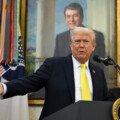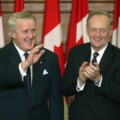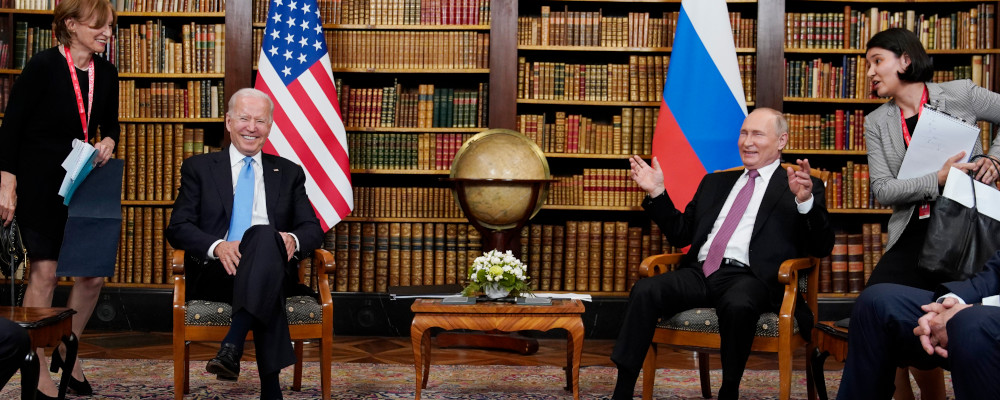It’s not difficult to make the case that the current world situation resembles the 1930s.
A European dictator is threatening a small nation on its border. He has illegally annexed a portion of the smaller country. After amassing troops on the border, the dictator pretends that he only wants peace, and tells Western nations to stay out of the fray, or else.
Domestically, Western nations are in chaos, reeling from a worldwide economic and social catastrophe and politically divided by radical factions from the right and left, both convinced that the social order should fall.
Of course, in the 1930s the authoritarian regime was headed by Germany’s Adolf Hitler and now it is Russia’s Vladimir Putin. The worldwide crisis was then the Great Depression and now it is the catastrophe of COVID-19. In the 1930s polarization was spurred by battles between fascists and communists while now it is the sapping polarization of the alt-right vs the woke.
The 1930s analogy is useful and somewhat compelling.
It seems even more powerful when commentators wonder just how far America and its allies should go in standing up to Russia. Would a failure to counter Putin represent capitulation or appeasement? Would this be another Munich?
That city—or rather the September 1938 meeting in Munich between Hitler and British prime minister Neville Chamberlain (and the Italians and French)—became a symbol of just how badly statesmen can get things wrong by appeasing dictators.
Appeasement dominated the approach to Hitler in the 1930s. When Hitler remilitarized the Rhineland, many said that this was no big deal because it was German territory after all. Weren’t the terms of the Treaty of Versailles too onerous? When Hitler concocted the take-over of Austria— the Anschluss—it was easy to say that, after all, most Austrians were of German origin and wanted to be united with the Germans (Hitler himself was really Austrian). Then, when Hitler wanted to take over the Sudetenland, that region of heavily German-speaking Czechoslovakia, there too it could seem that this was a reasonable demand. Why would Britain—let alone Canada—ever go to war over a tiny country in eastern Europe?
Yet in September of 1938, Britain’s international alliance with France threatened to bring war anyway because France had backed the Czechs and this sucked in the Brits. War seemed so imminent that Londoners were trying on gasmasks and movers had packed up the art treasures of the National Gallery.
So when Chamberlain flew to Munich and returned with a signed deal to guarantee “peace in our time”, crowds erupted with joy. Never mind that he essentially capitulated to Hitler. The Canadian prime minister William Lyon Mackenzie King, an ardent appeaser, telegraphed Chamberlain to say that “the heart of Canada is rejoicing tonight” and that “your achievements… will ensure you an abiding and illustrious place” in history.
Of course, Chamberlain’s trip to did guarantee him a place in history—but not the one King promised. Instead, it was a memorial to credulousness and shame.
Only months later, Hitler marched troops into the rest of Czechoslovakia. The piece of paper and Hitler’s signature meant nothing.
Chamberlain and the “men of Munich” belatedly learned their lesson and stood up to Hitler when he made his next move on Poland. Ever since the lessons of Munich have stuck with us. Stick up to dictators. Beware appeasement. The fates of small nations matter.
Is this the situation we face now? Is Putin another Hitler? Is Ukraine akin to Poland or Austria or Czechoslovakia? A number of commentators seem to think so—and it doesn’t hurt that Netflix has freshened up the analogy by coincidentally launching a new movie on the very topic.
I’m a historian and can’t profess to answer these imponderable questions. I can say, though, that it definitely matters how accurate our assessment is of Putin himself. Some Western leaders—King most embarrassingly—got Hitler completely wrong. They were fooled by his rhetoric of peace and victimhood. King listened to Hitler talk of his love of Wagner and, looking into the dictator’s blue eyes, fooled himself to think what he already wanted to think: that this man of the people only wanted peace. The wisest of Canadian prime ministers couldn’t have been more wrong.
But before we get caught up in thinking that the crisis with Ukraine is just like that faced by the men of Munich we should also ask ourselves if our popular understanding of the crisis is correct. Historical analogies can be useful but only when applied nimbly.
Why did people like Chamberlain fall for appeasement?
Partly they did so because their citizens wanted them to. Almost no one wanted war in the interwar years. Countries like Britain, France, and Canada were obsessed with peace and disarmament and had been for years.
Perhaps more importantly for our purposes, though, is the multipolar nature of the international threats in the 1930s. It was never only about Germany. The reason so many were willing to appease Germany is that they were faced with so many intersecting dangers. They felt they couldn’t face them all at once, and couldn’t be sure that if they did face up to one authoritarian regime, another wouldn’t take advantage of the crisis for its own ends.
Fascists took power in Italy in the 1920s under Mussolini. They invaded Ethiopia (or Abyssinia as it was then known) in 1935 and the world watched and let it happen. As allied statesmen contemplated action against Germany, Italy was always on their minds.
In the far East, Japan threatened both Britain and America. The Japanese had already invaded Manchuria and had attacked China again in 1937. If the British stood up to Germany, would this give the Japanese free reign to attack Singapore, Hong Kong, and India?
Then there was the real threat of Communism. As distasteful as the Nazis were, didn’t the West have more in common with Germany than with Communist Russia? Remember Stalin was in the midst of purging his nation’s internal enemies, sending hordes of political victims to the Gulag, and forcefully starving millions. Would a conflict with Germany not simply open the way to the brutal expansionary Communists?
All of this is to say that the lessons of Munich are both specific and multiple. Yes, there is the need to stand up to aggressors. But which ones? Who is our enemy and who could be our ally? We too now live in a multi-power world and the power of rising China looms menacingly. So do the nuclear powers of North Korea and (possibly) Iran.
Less than a year after Munich, Britain tried but failed to negotiate an alliance with the Soviet Union. Instead, it was, improbably, the Nazis who signed a non-aggression pact with their Bolshevik enemies. This incredible coup allowed Hitler to gamble on war and invade Poland. There is more than one lesson from the chaos of the 1930s.
Who is Hitler in the current scenario? Who Chamberlain? Who Stalin? And, most depressing of all, who is the utterly clueless Mackenzie King, still clinging on to appeasement well into the autumn of 1939 and long after the other men of Munich had come to their senses.
The lessons of Munich leave us in murky waters. Which international enemy should we engage to protect or enhance our strategic interests? Is facing up to Russia necessary or helpful? Would a strategic compromise be the same as appeasement?
Historical analogies can’t solve our problems but they can be instructive. As in the 1930s, we’re playing chess against multiple opponents. As Canada moves its tiny pawn into Ukraine, hopefully someone is thinking several moves ahead.
Recommended for You

This turbulent trade environment is a new reality, not a temporary storm

Is Alberta justified in using the notwithstanding clause to legislate teachers back to work?

Need to Know: Is China a smart hedge against Trump’s America—or is that dangerously naive?

‘Canada finds itself on the outside looking in’: Trump’s trade tantrum reveals deeper Canada-U.S. tensions beyond the Reagan ad



